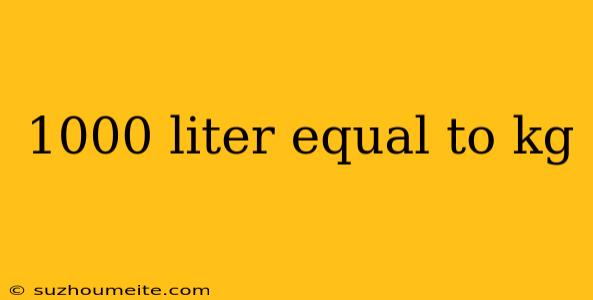1000 Liters Equal to How Many Kilograms?
Have you ever wondered how much 1000 liters of a substance weighs? The answer depends on the density of the substance. In this article, we'll explore how to convert 1000 liters to kilograms for different substances.
What is Density?
Density is defined as the mass of a substance per unit volume. It is usually expressed in units of kilograms per cubic meter (kg/m³) or grams per milliliter (g/mL). Density varies from one substance to another, which means that 1000 liters of different substances will have different weights.
Converting 1000 Liters to Kilograms
To convert 1000 liters to kilograms, we need to know the density of the substance. Here are some examples:
Water
The density of water is approximately 1 gram per milliliter (g/mL) or 1000 kilograms per cubic meter (kg/m³). Therefore:
1000 liters of water = 1000 kg (since 1 liter of water weighs 1 kilogram)
Gasoline
The density of gasoline is approximately 0.74 grams per milliliter (g/mL) or 740 kilograms per cubic meter (kg/m³). Therefore:
1000 liters of gasoline = 740 kg (approximately)
Crude Oil
The density of crude oil is approximately 0.88 grams per milliliter (g/mL) or 880 kilograms per cubic meter (kg/m³). Therefore:
1000 liters of crude oil = 880 kg (approximately)
Milk
The density of milk is approximately 1.03 grams per milliliter (g/mL) or 1030 kilograms per cubic meter (kg/m³). Therefore:
1000 liters of milk = 1030 kg (approximately)
As you can see, 1000 liters of different substances have different weights due to their varying densities.
Conclusion
In conclusion, 1000 liters of a substance is not always equal to 1000 kilograms. The weight of a substance depends on its density, which varies from one substance to another. By knowing the density of a substance, we can accurately convert its volume to weight.
